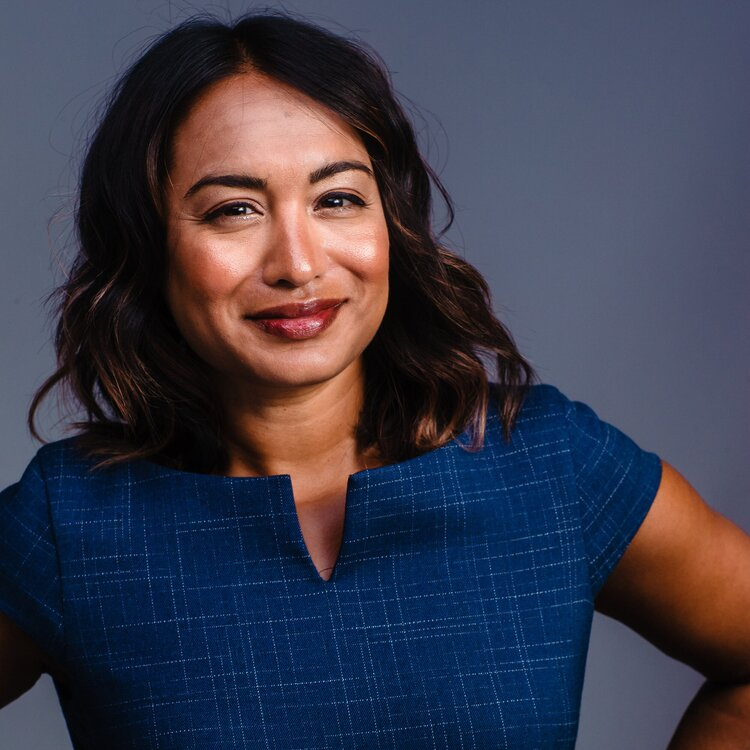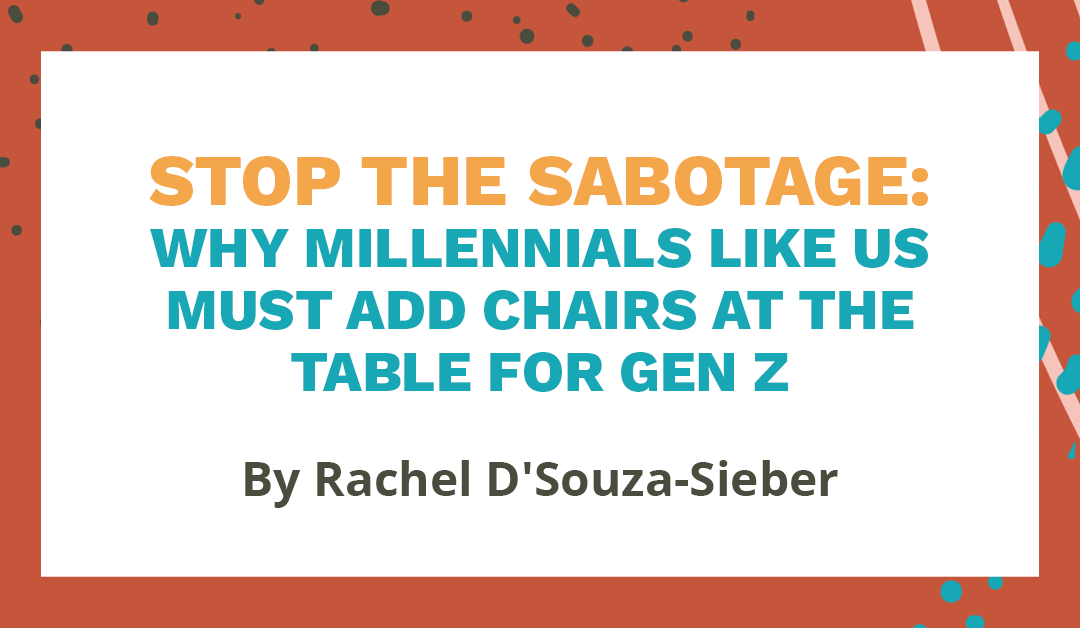By Rachel D’Souza, Founder + Chief Purpose Officer, Gladiator Consulting, Sr. Director, Resource Development + Justice Philanthropy, Forward Through Ferguson
Friends. I am turning 40 this summer. I am milleniOLD. An elder millennial. Some might say a geriatric millennial — which is just rude, y’all. I still feel young, despite listening to chats that my children — both born after 2010 and currently categorized as Gen Alpha —— have songs and trends and technology that I’m completely clueless about.
Gen Z is entering the workforce and I can see my Millennial peers, along with Gen X and Boomer leadership, dismissing the youth perspective in favor of “what we know works.”
Sometime in the last decade, I went from being one of the youngest people in the room to one of the oldest. I did not realize this shift had occurred until recently, when I was on a Zoom with a client. During an icebreaker, we all had the chance to share one of our favorite teenage/coming-of-age movies.
I could not wait to drop “Empire Records” and “Can’t Hardly Wait” in the chat.
Not a single person on this call had seen either film. For shame, all. For shame.
There was a brief moment where I felt insecure about it — like, am I out of touch now? Have I suddenly become the eclectic auntie who jokes about “the Tik Tok” and tells too many stories about her children?
In a blink, I moved past the shock. Because with age, comes power. And, if simply being an elder millennial afforded me a new level of influence and power, then I must use this privilege for good. But how?
When I began my first nonprofit job in 2007, my new workplace was dominated by Gen X and Boomers; even a few Silent Generation employees walked the halls.
(BTW, I know that these generational labels, while useful to talk about those born during a specific time frame, are not scientific in any way. Sometimes these labels tend to offer stereotypes and generalizations that are not accurate for every person born during that generation span and often ignore the experience of marginalized groups. I’m using these terms to mostly refer to age and will do my best to leave out the generalizations (i.e. latchkey kids, avocado toast, Euphoria stans, Among Us players, etc).
I was excited. I was ready to bring the full scope of my academic education, lived experience, and passion to the organization. In my middle-management role, I was ready to change the world.
It turns out that no one was particularly interested in or ready for me.
There was hierarchy.
There was formal and informal organizational culture.
There was, “This is the way we do things around here.”
The first challenge on my plate was to get in line. Learn how to work within the system. Get comfortable with a slow pace of change. I felt that I had so much to learn and so much to offer, but that I needed to keep myself small — to take up very little space — in order to be heard and respected.
It made me feel disheartened and at times, unmotivated. I remained a dedicated employee and worked hard to excel in my role though, even earning a couple promotions during my time there.
Millennials: Could we be the generation that puts a stop to this harmful cycle in the nonprofit workplace?
But, I never really learned what I wanted to learn or changed what I believed needed to be changed — and often, I wonder what I should have done differently.
Here we are, fourteen years later. As I became milleniOLD, I founded and continue to lead a successful boutique consultancy, which gives me and my team the privilege to work with many nonprofit organizations in our local community and more recently, across the country.
And friends, it kills me to watch history repeat itself.
Gen Z is entering the workforce and I can see my Millennial peers, along with Gen X and Boomer leadership, dismissing the youth perspective in favor of “what we know works.”
Einstein famously offered, “Insanity is doing the same thing over and over and expecting different results.”
Millennials: Could we be the generation that puts a stop to this harmful cycle in the nonprofit workplace? Could we offer Gen Z what we were denied in the early days of our careers? Are we the ones we’ve been waiting for?
Millennial leaders in any role within your organization, I invite you to try the following in 2022:
Make space at the table for Gen Z — or make a new table.
Let’s stop the practice of keeping young people out of the room where decisions are being made. Instead, what if we invited their experience and gave them some responsibility to advance the work of our organizations? Alternatively, you could coordinate a space where Gen Z could collaborate with peers and offer recommendations to institutional decision-makers. Either way, it’s time to listen.
Provide resources to support their ideas.
Few things have made me more frustrated than to watch leaders chuckle while giving members of their team “enough rope to hang themselves.”
WHAT IS THAT?
What is it about our own unresolved workplace trauma that drives this behavior? We have the choice to stop. Our younger peers do not just need us to listen — they need us to use our power and influence to resource their ideas. They need the budget to support their learning through mentorship, coaching, and professional development opportunities. They need us (or someone) to help them figure out how to access the technology or other resources needed to support the changes and shifts they seek.
Help them fly — or fail.
Learning opportunities are not a waste of time. Growth and change don’t happen without audacity and risk-taking. Ask your Gen Z colleague how you can show up for them. Offer space and time for them to test ideas.
And when they experience success or failure, help them parse out what they learned. Hold space for the reality that learning from failure is an excellent way to grow. Then, help them plan for their next try.
We have so much on our plates these days. It is challenging to juggle the flaming torches that are our daily priorities and frankly, it might be hard to get out of bed some mornings. And yet, we chose this line of work because we wanted to drive change. We must choose to break the institutional patterns of dysfunction and lead differently in our ever evolving, intergenerational workplace.

Rachel D'Souza
Rachel D’Souza (she/her) is the Founder+Principal of Gladiator Consulting in St. Louis, Missouri. Through Gladiator, Rachel has combined her knowledge of organizational culture and fund development with her deep personal commitment to centering community, seeking justice and creating belonging for those who have been disenfranchised or targeted by institutions, systems, and policy.
Born to parents who immigrated to the U.S. from India, Rachel has always been passionate about bridging differences and celebrating what’s possible when we collaborate from a mindset of abundance, learning, and risk-taking. Rachel loves cooking, snuggling her kids, and Instagram.
Tip Rachel — PayPal: rachel.d.siebert@gmail.com; Venmo: @RD-Siebert0620; CashApp: $GladiatorRDS
Discover more from CCF
Subscribe to get the latest posts sent to your email.


wow that was exactly my first nonprofit job experience as well, I did not realize it was universal. I do believe we’re the ones we’ve been waiting for, and I’m super lucky to now be at an organization that values youth leadership. Thanks for sharing this!
Thanks so much for this article. I was excited to read it as I am GenX (just turned 51), and I have recently felt the impact of agism in a small nonprofit with 6/10 staff under the age of 30, and 2/10 under 40.
I’d like to add to this conversation that we need to have more discussions about the benefits of all kinds of communications styles, and the benefits of different generational experiences. Being younger than your peers is a valued perspective, as is being older. It is extremely important to deliberately have conversations in teams about difference, and how to have a beginners mind no matter how old you are. How to practice inclusion no matter the size of the group. How to create agreements and boundaries for taking care of each other while we have a big impact. No matter your age, the feeling of being heard, knowing that your ideas have value is an important part of accomplishment and learning from each other. We do need more conversations about how we may subtly be brushing aside (or even considering firing someone) because of age and cultural “fit”. And more skills training on what to do when there is tension between colleagues.
The exact same thing you described as happening in your first job has happened to me over and over in the nonprofit sector – I have tons of experience (20+ years in the field – and more but I don’t dare say how much). I am still enthusiastic and energetic about the work. I love to use my fundraising and strategic development skills to realize the dreams of program directors, the people served, and the mission. But I I’ve found that I am asked to play small in many many ways. I’ve been threatened by founding board members at board meetings that they will withdraw their donations in response to my new idea – they want to stick with what worked before. Each time, the ED or leadership has been younger than me, and messy board dynamics are taking up all their relational capacity so they don’t address things at the staff level. Each time, the org is “figuring out it’s HR practices”, and job descriptions are in flux. (Red flag, I know, I know).
What to do when GenZ staff entrusted with events planning express distain for the kinds of fundraising events that older people who might have hearing issues, or have a different notion of sleep hygiene because they are over 70 years old? Or the team’s idea of a fun team building is outdoors at a brewery under a tent in the rain, at the exact time I have to pick up my child. What do do when the most fun thing that the 20 something team wants to do is sports and your body is not able to do that thing? In my case, they just went without me.
Ageism is hard to prove, but I’d like to assert that it looks a lot like ablism. Since I suddenly find myself at age 50, I am now in a protected category. that includes pregnant people I can more easily understand how we would need protections. Ablism obscures difference by refusing to acknowledge it. Like pregnancy, I doubt many people socialized as women would know the first place to start with getting support for help in an agist workplace. (Plus, by the way the org is too small to have HR policies, and the HR committee is run by the board. Good luck with that!).
This is exactly why accessibility, equity and inclusivity needs to extend to everyone, and we need practice including all generations in the care we want to embody in our work. In fact, I’d love it if we’d all agree to stop focusing so much on generational difference and pull focus on commonality and kinship.
Thanks again for the article and the spark of the conversation!